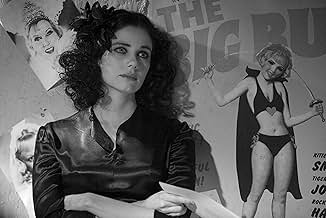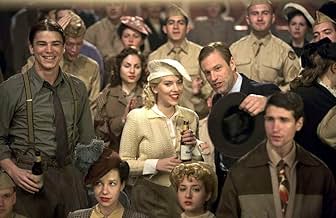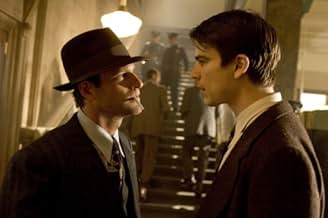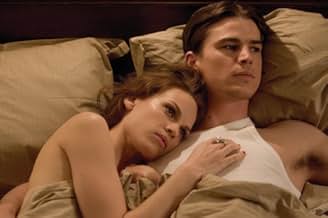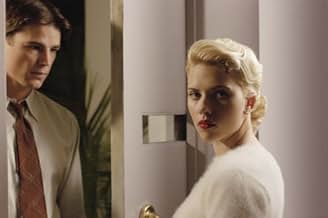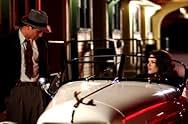Dos policías ven cómo se desmorona su vida personal y profesional al reabrir la investigación del asesinato de Elizabeth Short, "la Dalia negra".Dos policías ven cómo se desmorona su vida personal y profesional al reabrir la investigación del asesinato de Elizabeth Short, "la Dalia negra".Dos policías ven cómo se desmorona su vida personal y profesional al reabrir la investigación del asesinato de Elizabeth Short, "la Dalia negra".
- Dirección
- Guionistas
- Elenco
- Nominado a 1 premio Óscar
- 4 premios ganados y 16 nominaciones en total
Angus MacInnes
- Capt. John Tierney
- (as Angus MacInnis)
- Dirección
- Guionistas
- Todo el elenco y el equipo
- Producción, taquilla y más en IMDbPro
Opiniones destacadas
Fictional movie based on a real unsolved Hollywood murder in the 1940s. The mutilated body of Elizabeth Short (Mia Kirschner) is found in an empty lot. Officer Dwight Bleichert (Josh Harnett) and Sgt. Leland Blanchard (Aaron Eckhart) are assigned to the case. Blanchard becomes obsessed with the case causing troubles with his girlfriend Kay Lake (Scarlett Johansson). She then falls for Bleichert. Then there are more murders and lesbians and incest are thrown in...
The plot is a little too convoluted but so was the book (by Jack Ellroy). To be totally honest I can't understand why this is getting blasted by the critics. It's no masterpiece but it's 100 times better than director Brian DePalma's last film (2002's terrible "Femme Fatale") and probably his best work since 1996's "Mission Impossible". The 1940s setting is beautifully captured with clothes and settings--this film really looks great. DePalma once again gives us some incredible visual sequences--one murder is downright terrifying and one of the best things he's done in years. Also the plot, while involved, does reach a logical, satisfying conclusion. However the film isn't perfect.
There's a lesbian bar here that's really overdone. It's beautiful, with a ridiculously elaborate stage show--but in 1940s Hollywood? I don't think so. The acting is all over the place. Eckhart OVERACTS to a ridiculous degree. Hartnett is terrible (no surprise there) but so are Johansson and Hilary Swank (both wonderful actresses). It seems like Harnett's presence bring them down to his level of non acting. Last, and least, is English actress Fiona Lewis who is certainly acting but not in this picture. She overdoes it so much she makes Eckhart look restrained.
So I DID like it but with a tighter story and a better leading man this might have been great. As it stands it's a very good, well-made movie with some questionable acting. I give it a 7.
The plot is a little too convoluted but so was the book (by Jack Ellroy). To be totally honest I can't understand why this is getting blasted by the critics. It's no masterpiece but it's 100 times better than director Brian DePalma's last film (2002's terrible "Femme Fatale") and probably his best work since 1996's "Mission Impossible". The 1940s setting is beautifully captured with clothes and settings--this film really looks great. DePalma once again gives us some incredible visual sequences--one murder is downright terrifying and one of the best things he's done in years. Also the plot, while involved, does reach a logical, satisfying conclusion. However the film isn't perfect.
There's a lesbian bar here that's really overdone. It's beautiful, with a ridiculously elaborate stage show--but in 1940s Hollywood? I don't think so. The acting is all over the place. Eckhart OVERACTS to a ridiculous degree. Hartnett is terrible (no surprise there) but so are Johansson and Hilary Swank (both wonderful actresses). It seems like Harnett's presence bring them down to his level of non acting. Last, and least, is English actress Fiona Lewis who is certainly acting but not in this picture. She overdoes it so much she makes Eckhart look restrained.
So I DID like it but with a tighter story and a better leading man this might have been great. As it stands it's a very good, well-made movie with some questionable acting. I give it a 7.
De Palma's staged, theatrical style has always felt like an in-joke: an expressive homage (or sometimes a slap in the face) to the conventions of cinema. And in the case of his high- energy thrillers, the joke is funny and damned entertaining. But in the case of his dramas, De Palma constantly walks a thin line between evocative melodrama and camp (The wonderful "Carlito's Way," in my opinion, is the exception). And "The Black Dahlia" often steps over that line.
With a steady build-up of noir conventions, the film hearkens to the expressionistic film and acting styles of the 40's -- a style which can induce giggles in audiences raised on irony. And I can count a few musical swells, flamboyant acting choices and dramatic fade-outs which caused unwanted comic relief. Or did it? If there's one thing De Palma loves more than entertaining his audience, it's confounding them. How else do you explain the two-hour joke that was "Raising Cain"? (Although I, for one, found that particular joke damned funny).
You watch "Dahlia" with the distinct impression that De Palma is enjoying every minute of it. He's copying Wilder, Welles and, you guessed it, Hitchcock -- and he's having a blast doing it. So when Josh Hartnett's character pulls a full dinner setting (including the turkey) off a table and throws Scarlett Johansson down lustfully upon it, should we also smile and remember "Double Indemnity"? I guess it would help if you've seen "Double Indemnity."
That said, the film's biggest flaw is that it smiles at itself for so long that it leaves little time to wrap up the plot. The onslaught of last-reel revelations seems to exist only to give the actors more opportunity to relish in the delicious mood De Palma has created. We never really cared about the plot in the first place because De Palma didn't care about it either. He's more interested in the shadows, the thrills, the drama, the lurking killers, swelling music, lusty confrontations and blood splatters. And the plot points get lost somewhere in the mix. So who can blame us for glazing over when Hartnett finally starts to care about the mysteries rather than just being mystified by them? De Palma has painted such an odd, exciting picture (even when it turns to camp) that the audience would rather keep watching the elaborate set-ups than sit through the convoluted solutions.
But then again, what good is a joke without a satisfying punch line?
With a steady build-up of noir conventions, the film hearkens to the expressionistic film and acting styles of the 40's -- a style which can induce giggles in audiences raised on irony. And I can count a few musical swells, flamboyant acting choices and dramatic fade-outs which caused unwanted comic relief. Or did it? If there's one thing De Palma loves more than entertaining his audience, it's confounding them. How else do you explain the two-hour joke that was "Raising Cain"? (Although I, for one, found that particular joke damned funny).
You watch "Dahlia" with the distinct impression that De Palma is enjoying every minute of it. He's copying Wilder, Welles and, you guessed it, Hitchcock -- and he's having a blast doing it. So when Josh Hartnett's character pulls a full dinner setting (including the turkey) off a table and throws Scarlett Johansson down lustfully upon it, should we also smile and remember "Double Indemnity"? I guess it would help if you've seen "Double Indemnity."
That said, the film's biggest flaw is that it smiles at itself for so long that it leaves little time to wrap up the plot. The onslaught of last-reel revelations seems to exist only to give the actors more opportunity to relish in the delicious mood De Palma has created. We never really cared about the plot in the first place because De Palma didn't care about it either. He's more interested in the shadows, the thrills, the drama, the lurking killers, swelling music, lusty confrontations and blood splatters. And the plot points get lost somewhere in the mix. So who can blame us for glazing over when Hartnett finally starts to care about the mysteries rather than just being mystified by them? De Palma has painted such an odd, exciting picture (even when it turns to camp) that the audience would rather keep watching the elaborate set-ups than sit through the convoluted solutions.
But then again, what good is a joke without a satisfying punch line?
Have you ever been with a master storyteller who is hot? I mean in person. Its an absolutely captivating thing, watching the craft of captivating you. Its a worthy experience, even when the story isn't good. In fact, its even better when they story isn't good. You might wonder for a while why such a talented teller would choose the material she has, but will fade as you fall under spell of the storyteller, undistracted by the story. It you are lucky, she'll be a hand dancer and you will simply allow your soul to move with the undermusic.
dePalma never bothers me when he chooses bad actors, stories and such. Its just not relevant to what he has to offer, and in fact sometimes I'm thankful that the story itself doesn't get in the way. "Mission to Mars" was rewarmed tacos, but the fact that it was served by a metaphoric, genuine Spanish grandmother from her own hands was all that mattered.
About 22 minutes into this there is a wonderful crane shot, probably done without artificial assistance, beginning five minutes which is the heart of the overly complex story. It sets up two apparently unrelated threads in the story that interweave from this point. It is of the front of a building where later there will be a shooting, moves up and over the building to look at a vacant lot behind where we see a woman making a gruesome discovery. She runs to the street alongside the building where we see the car of our two cops coming to park in front and engage in a shooting. We move in front of the car to a bicyclist, who plays no role in the story. He brings us to a couple walking down the sidewalk approaching the front of the building where they will encounter our cops. We come down to street height and listen in on their conversation.
Its masterful. Even if you think everything that follows is a mess, its a glorious mess made glorious by our setting of the knitting needles.
This, my friends, is what noir is about these days: establishing an eye of god who both is us and who perturbs nature to suit conventions of coincidence in storytelling.
But there's another joy here too. The story no surprise features a film within the film. Its the whole story, there, with elements of that internal film overlapping the main story in three or four significant ways. The star of this inner film, who also is our bisected victim is a character played by Mia Kirshner. She's so much more alive and real than anyone else in the main story, I can only assume it was deliberate and a truly thrilling risk. If you follow film, you'll know her very similar and hugely complex role in "Exotica," a landmark film.
Two major experiences in a film! Of course its worth watching!
Ted's Evaluation -- 3 of 3: Worth watching.
dePalma never bothers me when he chooses bad actors, stories and such. Its just not relevant to what he has to offer, and in fact sometimes I'm thankful that the story itself doesn't get in the way. "Mission to Mars" was rewarmed tacos, but the fact that it was served by a metaphoric, genuine Spanish grandmother from her own hands was all that mattered.
About 22 minutes into this there is a wonderful crane shot, probably done without artificial assistance, beginning five minutes which is the heart of the overly complex story. It sets up two apparently unrelated threads in the story that interweave from this point. It is of the front of a building where later there will be a shooting, moves up and over the building to look at a vacant lot behind where we see a woman making a gruesome discovery. She runs to the street alongside the building where we see the car of our two cops coming to park in front and engage in a shooting. We move in front of the car to a bicyclist, who plays no role in the story. He brings us to a couple walking down the sidewalk approaching the front of the building where they will encounter our cops. We come down to street height and listen in on their conversation.
Its masterful. Even if you think everything that follows is a mess, its a glorious mess made glorious by our setting of the knitting needles.
This, my friends, is what noir is about these days: establishing an eye of god who both is us and who perturbs nature to suit conventions of coincidence in storytelling.
But there's another joy here too. The story no surprise features a film within the film. Its the whole story, there, with elements of that internal film overlapping the main story in three or four significant ways. The star of this inner film, who also is our bisected victim is a character played by Mia Kirshner. She's so much more alive and real than anyone else in the main story, I can only assume it was deliberate and a truly thrilling risk. If you follow film, you'll know her very similar and hugely complex role in "Exotica," a landmark film.
Two major experiences in a film! Of course its worth watching!
Ted's Evaluation -- 3 of 3: Worth watching.
Yes, all of it and more. The images are beautiful but what a mess. I don't need to understand what's going on if, at least, I'm entertained. Look at The Big Sleep for instance. There will never be another "Chinatown" I'm afraid, regardless of what Mr Ellroy thinks. The one element that sees you through this inconsequential mess is Josh Harnett's face. At times he looks as confused as I did and just as annoyed. Who can blame him? Hilary Swank, what was she doing? She looked like Vampyra's sister, the boring one. What a catastrophic piece of casting. And Fiona Shaw? If the film had been all like her performance the flick could have had a chance at the campiest "noire" ever put on film ever. But not such luck. All this said and done, it's a De Palma movie and that counts for something. Black Dahlia is certainly better than Snake Eyes but as a De Palma fan I felt terribly let down.
Anybody expecting to get a great account of the Black Dahlia case, even fictional, will be disappointed going in to this movie. Of course, I knew that it was a fictionalization of the case, but I had no idea the movie would present its own evidence and draw its own conclusions.
But the main problem here is not the lack of factual detail, so much as the confusion of plot that surrounds and overwhelms the Black Dahlia case itself. So much plot and character and sideplots and backstory are built around the central characters that the case itself seems like a distraction. A key plot point and character motivator is the fascination of the two detectives with the murder, but this is never elaborated enough in the film, and we're left to half-heartedly guess at the character motivations.
The tone is never consistently campy, but when the camp arrives it overwhelms the story. A dinner scene between a suspect and her family had the crowd in stitches (the only scene during which the audience laughed). The problem is that the scene is valuable to the plot and should never have been played for laughs. Hitchcock or even Lynch could have shot the same scene, with the same events and dialogue, and made it menacing and creepy, which it needed to be to function in the mystery.
Other problems: De Palma uses the lesbian angle of the movie (never a part of the case) to full exploitative advantage, and the actresses seem unable to master to the expressive 1940s style acting that would have come naturally to even a marginal 40s star.
Although the film brings a clearcut finale rather than a vague puzzle, too many loose threads come together too neatly and rather than bringing the film to a satisfactory conclusion, it leaves you scratching your head, is this what I spent the last 2 hours waiting to hear? Overall, there is too much plot, too little character development and a wildly uneven tone. The movie has its moments but it's a blinding mess all together.
But the main problem here is not the lack of factual detail, so much as the confusion of plot that surrounds and overwhelms the Black Dahlia case itself. So much plot and character and sideplots and backstory are built around the central characters that the case itself seems like a distraction. A key plot point and character motivator is the fascination of the two detectives with the murder, but this is never elaborated enough in the film, and we're left to half-heartedly guess at the character motivations.
The tone is never consistently campy, but when the camp arrives it overwhelms the story. A dinner scene between a suspect and her family had the crowd in stitches (the only scene during which the audience laughed). The problem is that the scene is valuable to the plot and should never have been played for laughs. Hitchcock or even Lynch could have shot the same scene, with the same events and dialogue, and made it menacing and creepy, which it needed to be to function in the mystery.
Other problems: De Palma uses the lesbian angle of the movie (never a part of the case) to full exploitative advantage, and the actresses seem unable to master to the expressive 1940s style acting that would have come naturally to even a marginal 40s star.
Although the film brings a clearcut finale rather than a vague puzzle, too many loose threads come together too neatly and rather than bringing the film to a satisfactory conclusion, it leaves you scratching your head, is this what I spent the last 2 hours waiting to hear? Overall, there is too much plot, too little character development and a wildly uneven tone. The movie has its moments but it's a blinding mess all together.
¿Sabías que…?
- TriviaWhen Dwight "Bucky" Bleichert goes searching through some photographs, you can see a real autopsy photo of Elizabeth Short.
- ErroresWhen Bucky Bleichert enters Sheryl Saddon's bedroom to get the suitcase, there is a postcard-sized picture of Bettie Page on the wall. Bettie Page did not start modeling until 1950.
- Citas
Emmet Linscott: What kind of name is Bleichert? Dutch?
Ofcr. Dwight "Bucky" Bleichert: German.
Emmet Linscott: Ah, a great people, the Germans. Hitler was a bit excessive. But mark my words that someday we'll regret not joining forces with him to fight the Reds.
- Bandas sonorasIn the Mood
Written by Joe Garland (as Joseph C. Garland)
Used by Permission of Shapiro Bernstein & Co. Inc. (ASCAP)
Selecciones populares
Inicia sesión para calificar y agrega a la lista de videos para obtener recomendaciones personalizadas
- How long is The Black Dahlia?Con tecnología de Alexa
- What is "The Black Dahlia" about?
- Is "The Black Dahlia" based on a true story?
- How was "The Black Dahlia" received by critics and audiences?
Detalles
- Fecha de lanzamiento
- Países de origen
- Idiomas
- También se conoce como
- The Black Dahlia
- Locaciones de filmación
- Productoras
- Ver más créditos de la compañía en IMDbPro
Taquilla
- Presupuesto
- USD 50,000,000 (estimado)
- Total en EE. UU. y Canadá
- USD 22,545,080
- Fin de semana de estreno en EE. UU. y Canadá
- USD 10,005,895
- 17 sep 2006
- Total a nivel mundial
- USD 49,332,692
- Tiempo de ejecución2 horas 1 minuto
- Color
- Mezcla de sonido
- Relación de aspecto
- 2.35 : 1
Contribuir a esta página
Sugiere una edición o agrega el contenido que falta

Principales brechas de datos
By what name was La Dalia Negra (2006) officially released in India in Hindi?
Responda






